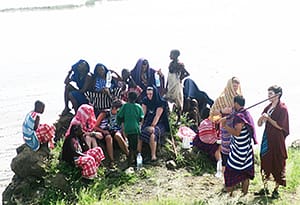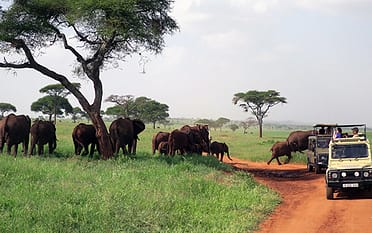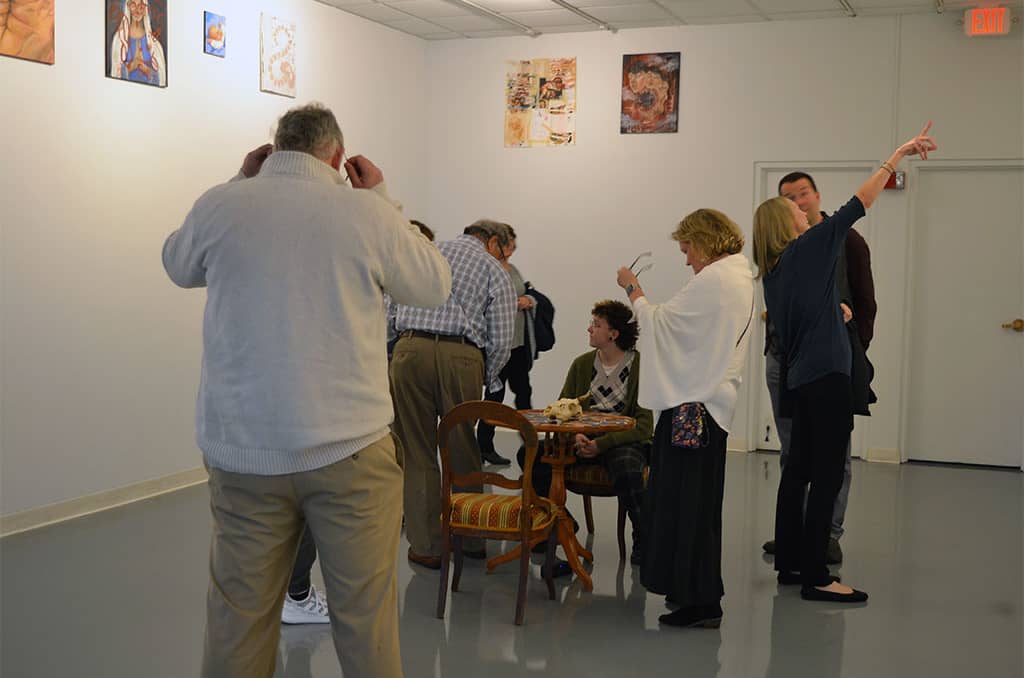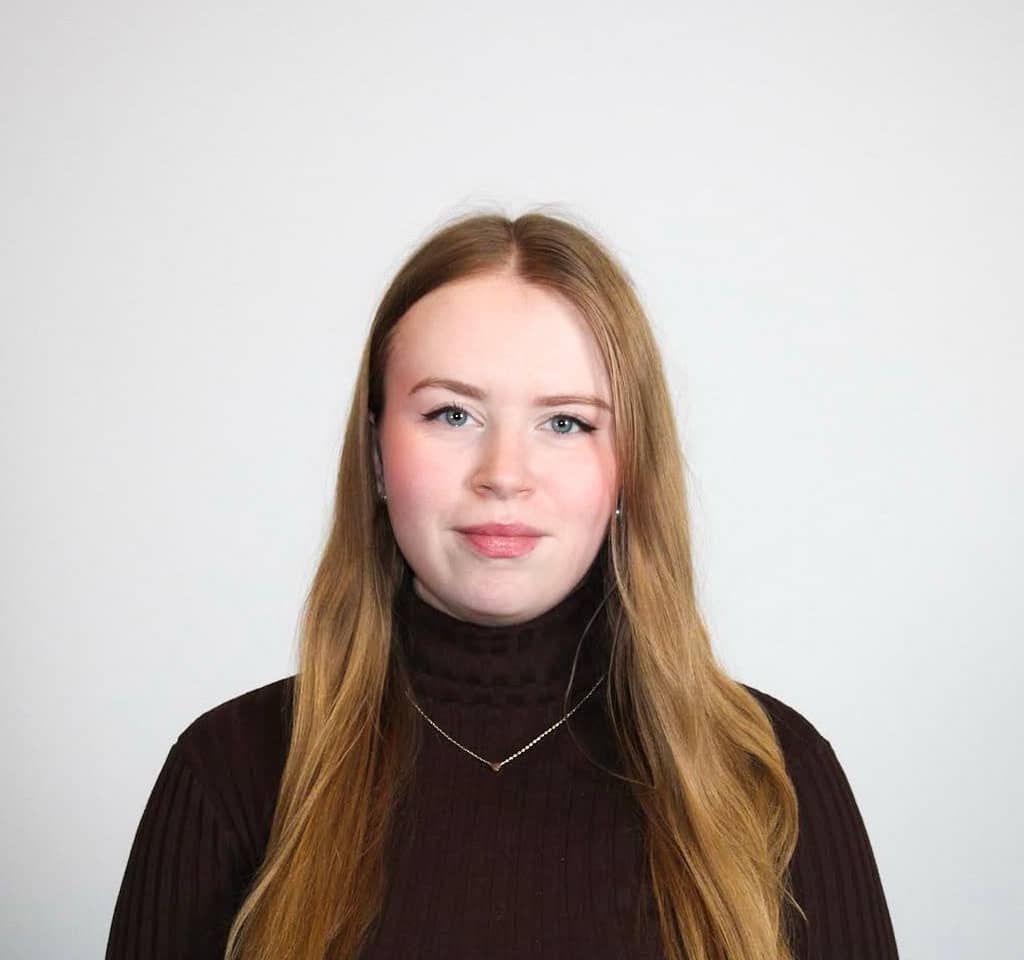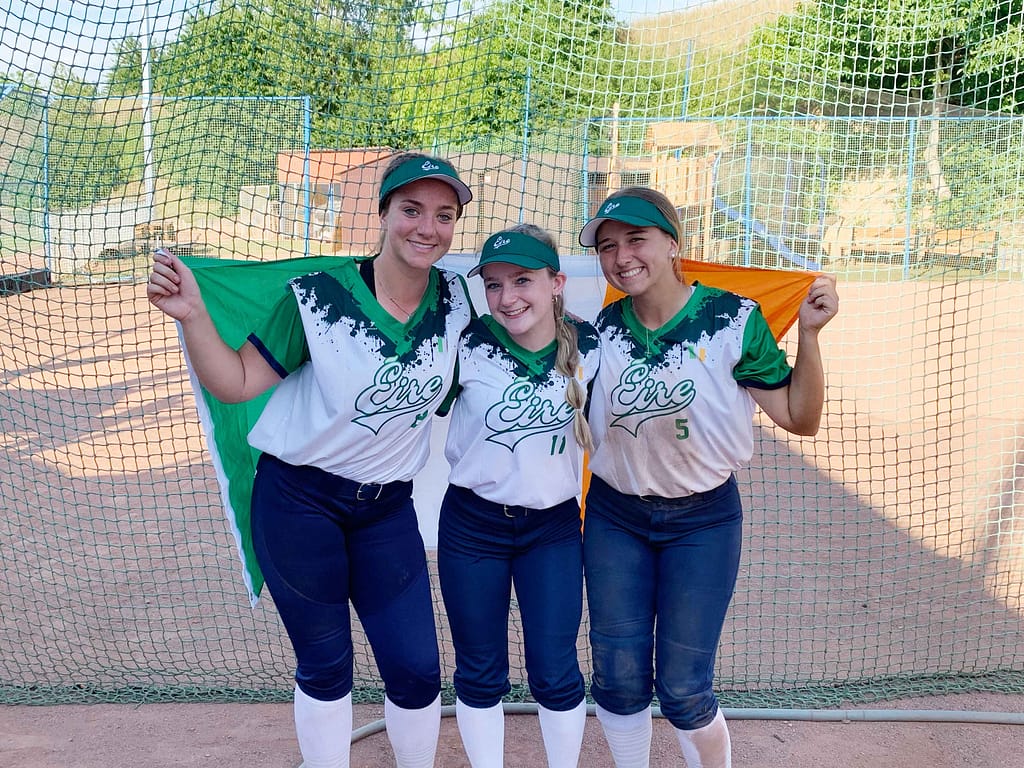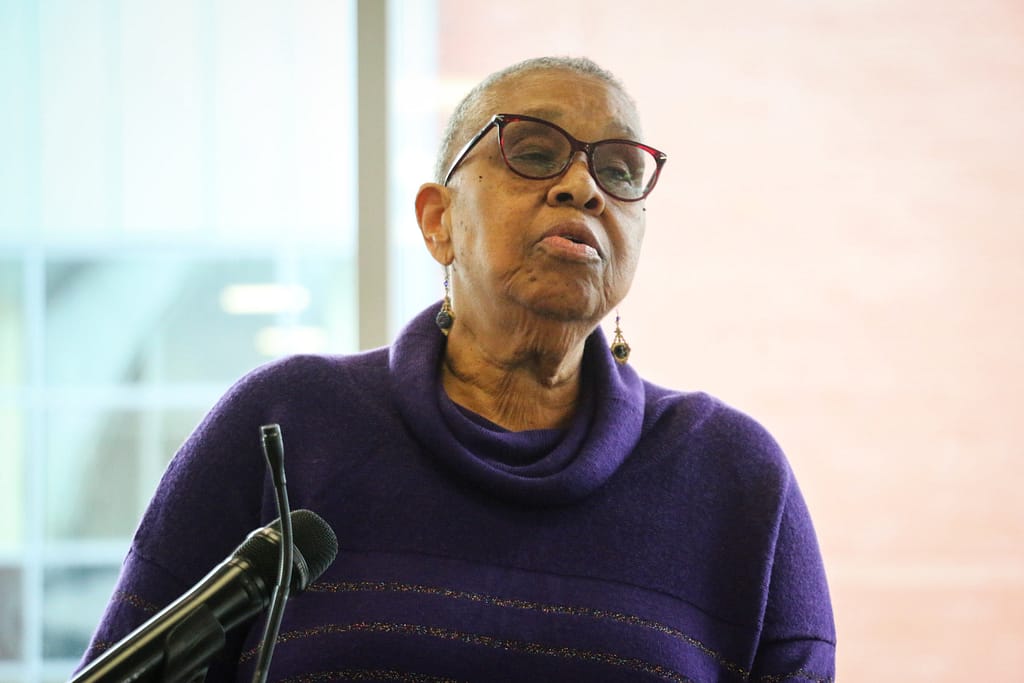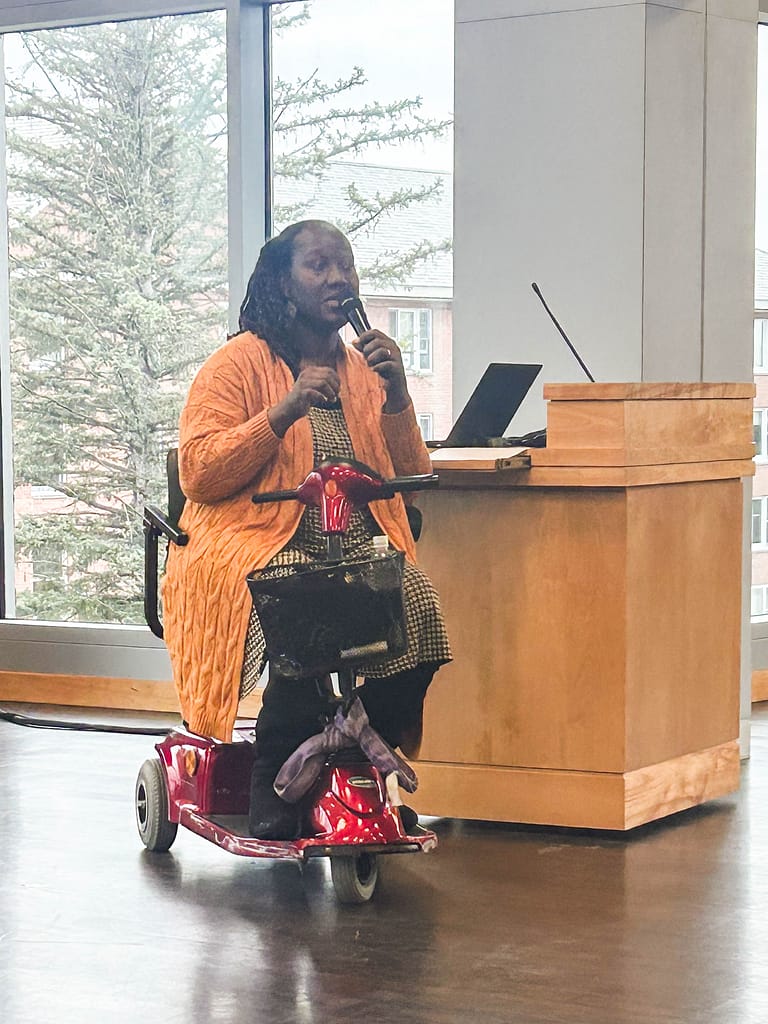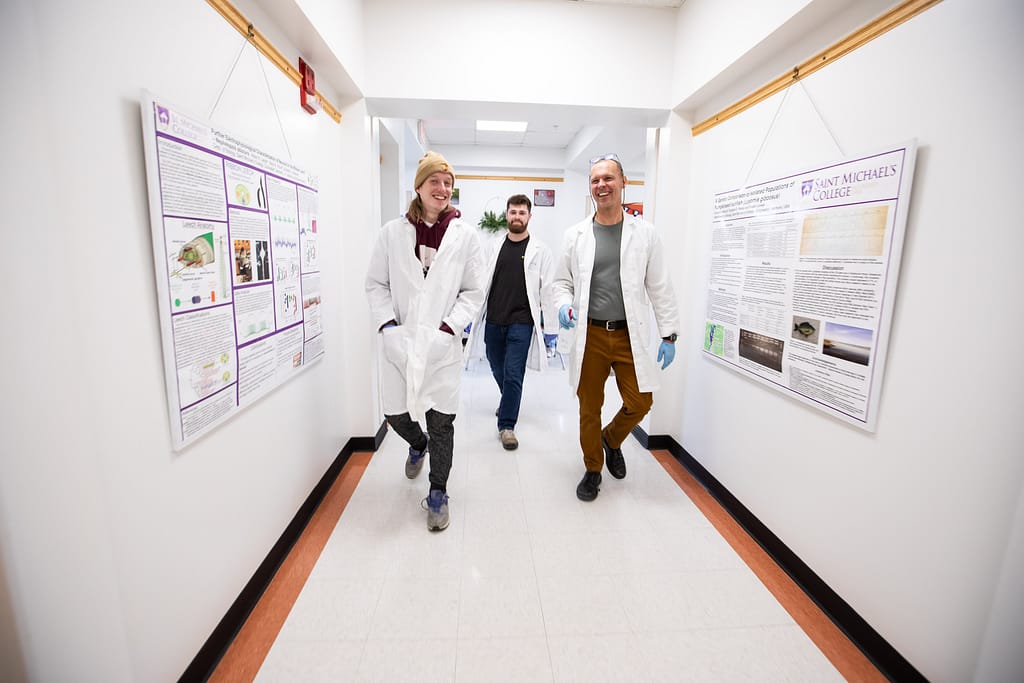In Tanzania, student encounters life, soccer and self
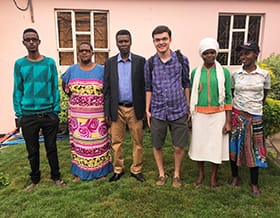
The photo directly above shows him with his homestay host family in Arusha; descending photos show Lance with his homestay brother, with students from his program and Maasai people by the water; and a scene of elephants he took during a photo-safari.
Against all probability, Lance Reynolds, a serious baseball fan, aspiring sportswriter and Saint Michael’s College cross-country runner, found himself in Tanzania this past spring semester, exploring the personal-development possibilities of soccer, and of taking chances.
The rising senior student-journalist from Mansfield, MA, might tell you those words “found himself” describe substantial personal growth and perseverance that go way beyond simply landing geographically late this past January in the chiefly soccer-loving southeastern African nation, to undertake — of all things, given his background — a wildlife conservation/political ecology program through the School for International Training. Somehow, he parlayed the opportunity into an independent study project on Tanzanian soccer academies’ major impact on child development among mostly economically challenged youth.
Wait ….what? Reynolds smiles and readily acknowledges that he entered Saint Michael’s as a distinctly unworldly soul who, by nature and experience, would expect to feel far more at-home in his present summer-intern gigs for the Vermont Lake Monsters Single-A baseball team and local ESPN radio 101.3 (while living on campus) than fully immersed in an entirely unfamiliar culture halfway around the world. His family – engineer dad, nurse mom, two older brothers – never traveled together farther than the U.S. before he came to St. Mike’s, and only an earlier short trip to Ecuador with a college friend had given him an inkling about the wider world. Soccer never held more than slight passing interest for him.
Given all that, a destination like Tanzania,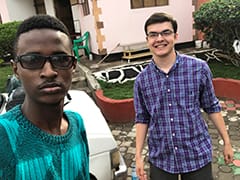 much less a program like the one he completed as a non-scientist, would not even have landed in Reynolds’ ballpark of possibilities, if not for perceptive and supportive Saint Michael’s College mentors who recognized and honored the slightly unorthodox individuality that makes Reynolds tick — ultimately steering him toward experiences most likely to give him a fully realized life beyond just a narrow career-track and interests.
much less a program like the one he completed as a non-scientist, would not even have landed in Reynolds’ ballpark of possibilities, if not for perceptive and supportive Saint Michael’s College mentors who recognized and honored the slightly unorthodox individuality that makes Reynolds tick — ultimately steering him toward experiences most likely to give him a fully realized life beyond just a narrow career-track and interests.
To hear Reynolds describe it, his advisers and professors worked warmly and wisely with rather than against what an extended conversation with him reveals to be his innocently endearing, matter-of fact and spontaneous inclination to fearlessly “go with the flow” and “just go for it” when assorted influences happen to enter his life and ring his bell — by chance or serendipity – wherever it might take him. He’s not one to belabor or over-worry about even major decisions, he says.
How he ended up at St. Mike’s is a telling example: He’d not heard of the College before, but came to Hoehl Welcome Center with his parents for a Vermont visit his senior high school year and by chance saw the Red Sox broadcaster and alumnus Tom Caron ’86 on a video looping in the lobby. “I’d been watching him since I was 8 as a big fan of the Red Sox, and I thought, if he could come here and have a career like that, maybe I could too.” Based mostly on that one influencing moment, he says, the deal was sealed.
His Tanzania decision last year was similar: a former fellow staffer at the student newspaper The Defender had been to a journalism program in Morocco that sounded good to him, so he set his sights on that until some deadlines came and went, and his journalism faculty advisers Allison Cleary and Traci Griffith concurrently urged him to try something different — still allowing writing, of course, but also expanding cultural and academic boundaries to challenge his comfort zone beyond only journalism studies, in the best tradition of liberal arts education.
Just about that time, a friend happened to share online information about a Tanzanian ecology-focused semester the friend was considering, and Reynolds had been the Defender environmental editor in addition to his main sports focus only the semester before, so it felt like a path with some logic and appeal to meet the study-abroad requirement of his Media Studies, Journalism and Digital Arts (MJD) major.
“To tell the truth, I think the major reason I picked it was I couldn’t stand the cold, so I wanted to go somewhere that was hot, and I love learning about different animals, and thought I’d see some interesting ones there – elephants, giraffes,” Reynolds says. As usual, he didn’t want to stress about the decision – “wherever I was going to go, that’s where I was going to go” was his mindset, he says, so he looked no further for competing ideas, though his parents had hesitations about the whole thing. “I told them it’s going to make me grow and really be worth it – and it was,” he said.
“I survived,” is how Reynolds sums up his three and a half heady and limits-stretching months in Tanzania, a sensory roller coaster of ups and downs that included enriching but challenging homestays — one in a suburban Arusha household that spoke only Swahili, the other in a Maasai village tent sleeping on a cowhide – along with intensive Swahili lessons with about 20 others in his program who were drawn from top Colleges all over the U.S.; plus his Independent Study project that was slow getting off the ground with a few false starts on other ideas, yet became life-changing for him as he visited (with his translator) several soccer academies for mostly poor Tanzanian kids, to study those schools’ impact on child development in the nation’s third-largest city, Arusha, where he mostly stayed and studied.
While in Tanzania, he got more than mildly sick six different times — “and I’m not somebody who usually gets sick,” Reynolds says, recounting bouts with heat exhaustion and the highest fever of his life, dehydration, food poisoning, bedbug bites, a cold, a brief hospital visit or two and other episodes that he managed to power through, determined to keep on having the experiences that he came to love and value in spite of it all. Rather than staying in dorms, students in his mostly field-based programs spent 25 nights camping out in tents, he says, along with the home-stays. “I felt the last couple weeks I really belonged there, and felt sad when it was getting time to go home,” he says, adding that being back for the past few months has almost felt surreal.
Reynolds could be considered a poster-boy for making the most of many Saint Michael’s signature experiences even beyond Study Abroad: he says a first-year LEAP Retreat changed him, or at least started him, on the path from a mostly introverted personality to an extrovert who now has made lots of good friends among fellow students. Internships are helping him expand a now-solid resume for his dream of being a sports journalist, as this summer he is doing practical audio work for the local sports-radio station under professional guidance, writing recaps and interacting with team staff and players for the Lake Monsters; he also just finished a Photography and Tourism class through the Accelerated Summer College at St. Mike’s with Jerry Swope of the MJD faculty to expand his useful skills. He hopes to take a shot at a top editor post at the Defender as a senior this coming year while continuing to run cross-country as an enjoyable and worthwhile team-bonding experience — even though he typically finishes near the back of the pack. Reynolds feels that being a student-athlete is about so much more than being at the front of the race. “I bring some fun to the team, some goofiness, and I love being on the team,” he says.
The project he ended up doing in Tanzania was centered on the Lengo Football Academy, once he realized that for a sports enthusiast in that nation, soccer was virtually the only game in town. Lengo is a Swahili word for “goal” and the academy’s motto was “scoring goals for life.” The founder is a Tanzanian who founded a sister branch in Australia, and money from the Australian program helps provide free education for nearly 150 needy children. With his translator, Reynolds interviewed many students and coaches at Lengo, along with youth at a town youth organization in Arusha that centers on soccer, where kids would go to get off the street, he says, explaining that those he worked with and interviewed ranged from 10 to 23 years old.
“I became great friends with my translator and we talked about the NBA playoffs every day that we worked together, which gave me a sense of home, at a time when I needed it,” he said, adding that he has stayed in touch with Lengo people and plans to donate soccer equipment in the future. His final project consisted of a 35-page paper and a 40 minute presentation that normally would be nerve-wracking, but his excitement about it turned that to confidence, he said.
“My big take-away was just how powerful sports can be – they’re playing on dirt-puddles, yet they don’t care about that at all,” Reynolds says. “It was eye-opening just seeing these kids living life, finding the small things to find joy in and making the most of what they have – that was really powerful.”
